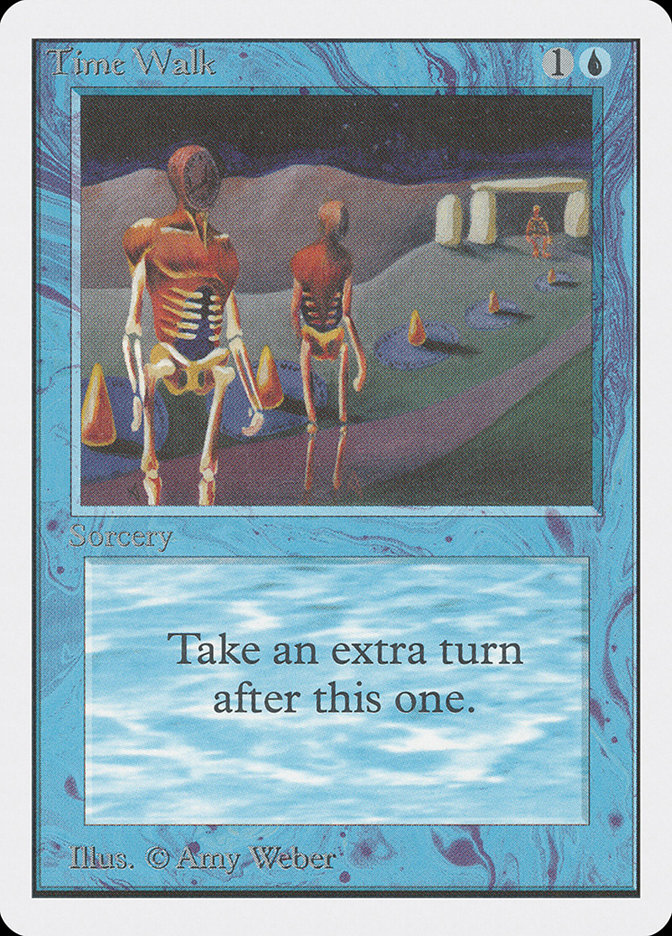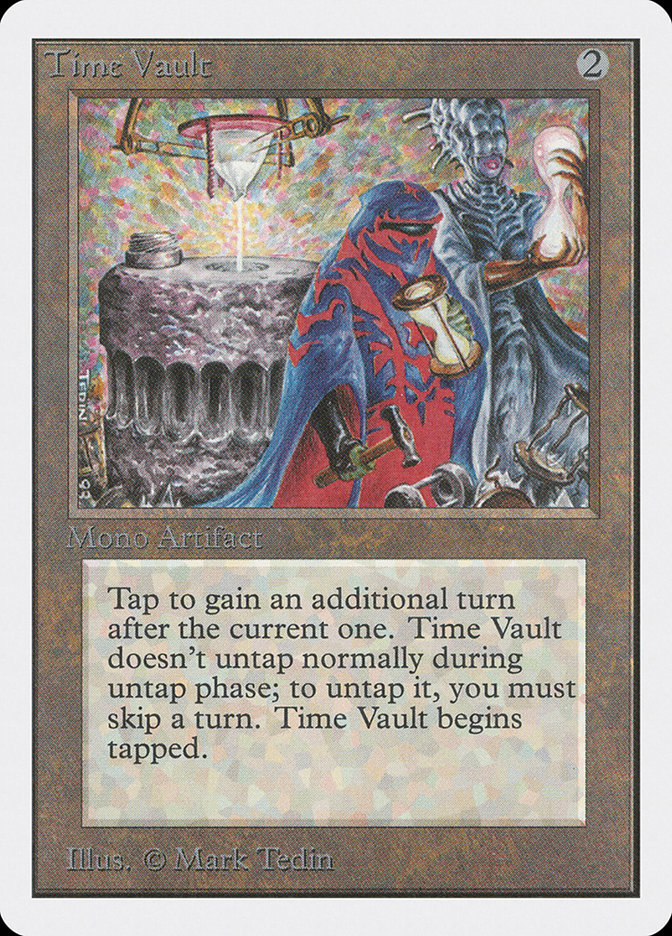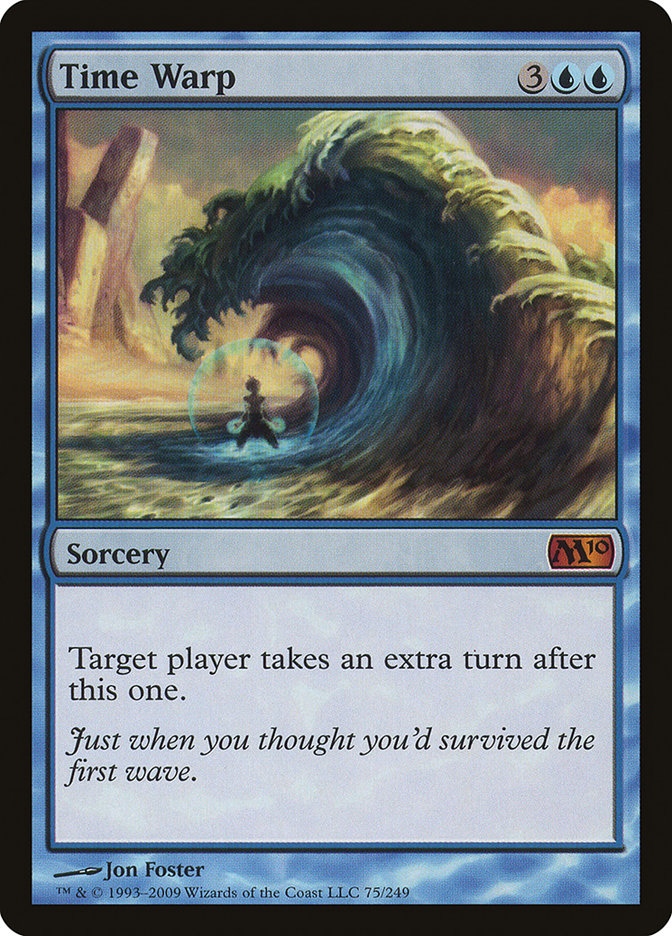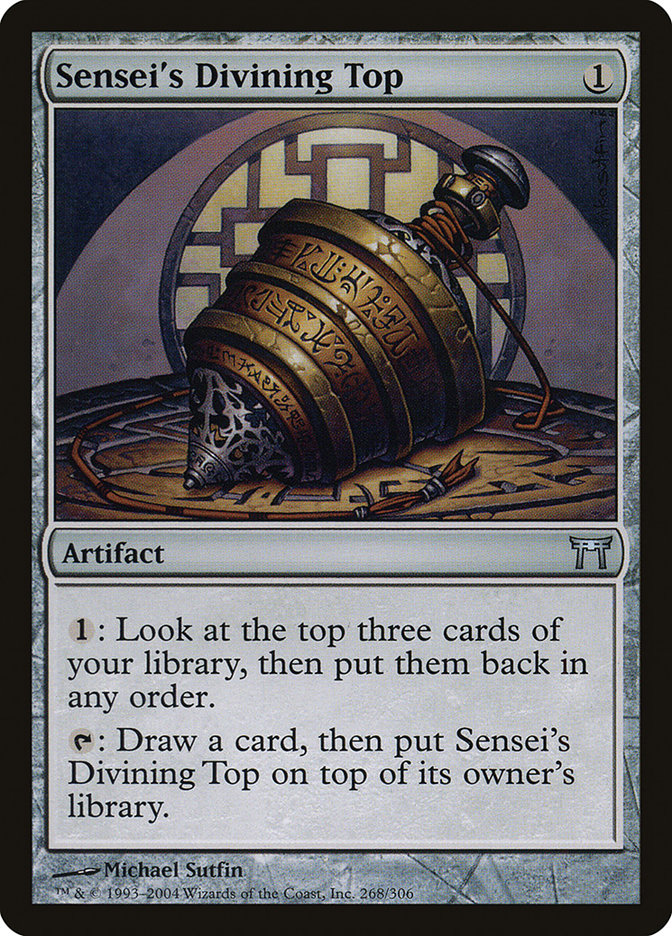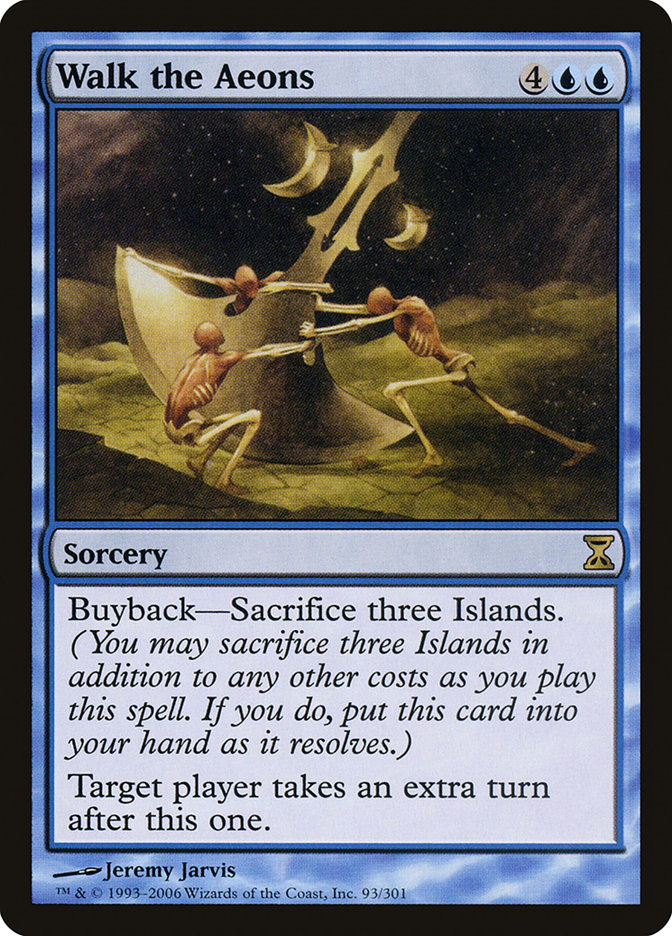Grand Prix Atlanta’s Commander Celebration just concluded, and I have a Commander hangover. Two-hour games, huge pods of players, and other forms of utter
Magic bliss are still swimming through my brain.
I asked a lot of people I played with to get me their Commander decklists. I’ve had lots of them sent to me, but I’d still like to give the other players
who may still be sleeping or traveling more time to send theirs. So I’m going to wait until my next article to publish those.
Thanks for the well-wishing and the games. That was a fun weekend.
Now then…
“Sensei’s Divining Top is a horror show. It is a nightmare without end.”
– Patrick Sullivan, SCG St. Louis Open
We’re going to talk about a strange subject today. It somehow manages to be both hot Standard tech and something to raise awareness within the Legacy
community. It is our best friend and our worst enemy at all points in our life.
I, of course, speak of…
Time.
Standard
Our old friend Standard is in a pretty good place. Most of the decks are sorcery-speed and clunky, which makes for some good Magic boxing as long as
everybody is working with the same slow cinderblock fists.
So what is Standard’s biggest flaw at the moment?
I like slow formats, I like slow Magic. Draws are bound to happen, rounds are bound to go to time, but we’re about one or two fetchlands per deck away from
this being an epidemic.
While we have to put a little responsibility on Magic’s higher powers-after all, they shaped this format by creating it-we also have to share some of the
blame ourselves. In fact, I put more of the blame on us than on them. It’s perfectly reasonable to criticize Magic development for a format that goes to
time too often if you’re also taking the following tips into account. If you aren’t adjusting your style using these pointers though, most of the
time you go to time, you can pretty much just blame yourself.
–Stop only activating fetchlands at the end of your opponent’s turn. There are lots of situations in historical formats where you need to
wait on your fetch for maximum information based on your hand. This Standard is not that format. You need to fix your mana to cast your spells and it makes
positively no difference if your opponent opens with a tri-land, their own fetchland, or a napkin with the word “Forest” written on it. If you play
Bloodstained Mire knowing damn well your hand requires you to go get a Sunken Hollow to function, just do it. Put it in the graveyard, tell your opponent
what you’re getting, and tell them it’s their turn.
You mulligan to six and keep this. The scry went to the bottom. You’re playing first.
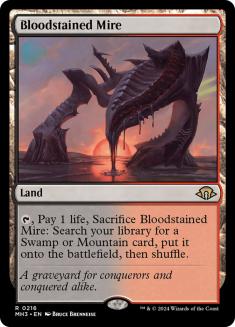
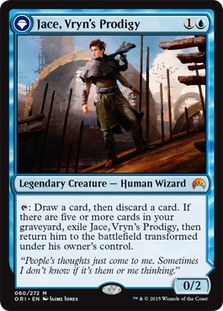
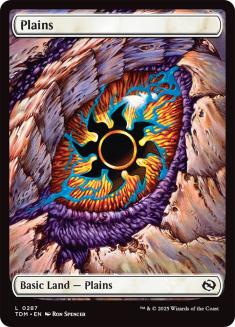

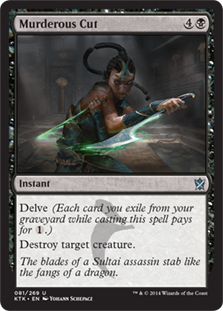
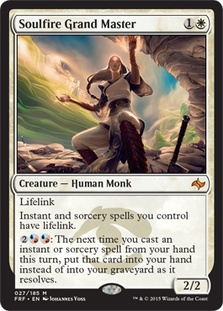

Fetch your land, bozo.
–Have sideboard plans before you go to the tournament. Innovation in Standard Magic at most levels is sort of the exception not the rule
these days. For every Sam Black and Christian Calcano solving problems by being creative, there are 10,000 players copy + pasting entire Jeskai Black 75s.
What that means is, when you go to a tournament, you’re going to spend most of your rounds against decks that are 100% on the radar in every way.
Sideboarding on the fly is important and always subject to a little tweaking, but you don’t have to be Jon Finkel to figure out that you probably need to
bring in Virulent Plague against the token decks. So be ready to do that before game 1 ends. Don’t look through your sideboard, look up at the ceiling and
think about nothing, then spend the next three minutes just making guesses. Take an extra five or ten minutes before a tournament to work on your game 2
and 3 gameplans. As the format becomes more predictable and stable, that extra five or ten minutes will translate into a lot of fast sideboarding periods
over the months.
-Don’t make stupid post-shuffle deck cuts.
This is my public enemy number one. About once a tournament in person or on camera, I see someone fetch or tutor or whatever, then their opponent picks up
the top half of the deck, sets it beside the other half, then plays with the cards in the bottom half-cutting them, shuffling them in some chunky way-then
puts the top half back on top. I would rather lose to a literal horse at Magic than someone who does this. Even if you leave the top ten or fifteen cards
of the deck the same, in a game with as many shuffle effects as this one, what have you actually done? Random is random. Why have you gone out of your way
to waste ten seconds of precious round time in order to arbitrarily touch your opponent’s cards?
Here are a few situations where this kind of cut makes sense:
-You’re seven years of age and nobody has given you attention in the last fifteen seconds.
-You’ve escaped from the home and the people with the nets and white uniforms haven’t discovered that you’re gone yet.
That is all. If you want to keep your opponent honest, cut their deck like a person. If you don’t want to cut their deck, tell them you don’t, and take
your turn.
-Uphold the REL of the event.
If you’re at FNM and your obviously inexperienced opponent has to think to do some combat math, let them. If they take twice as long as you to shuffle,
that’s okay. You can play faster to compensate.
If you’re at an Open or a GP and your opponent has been resolving Dig Through Time for a minute and a half, get your hand up and get a judge over. Slow
Play is the most under-enforced thing in competitive Magic, and that is almost solely on the shoulders of players being overpolite. Judges can’t be
everywhere at once. If your opponent takes forty seconds to figure out how they’re delving, then another two minutes picking which Dig Through Time cards
they’re keeping, you’re as much to blame as they are if you don’t have enough time left to finish your match. The Slow Play taboo is over with. Call it.
All of you.
-Don’t wait until the clock is gone to start playing quickly.
This is very much related to the “controversial play” bias in sports and sports coverage. Very frequently, an iffy foul call in basketball or a judgment
out/safe call in baseball will get all the attention the next day on sports talk shows and on social media. People will treat it as if it made the
difference in a one- or two-point game simply because it happened toward the end. Here’s the thing: Even if your team got hosed in the last three seconds
of a game, they had over a hundred plays or pitches to win the game elsewhere. People love the outcry and it makes for a fun debate the next day, but the
fact of the matter is games are played over the course of hours. There are tons of other iffy calls that swing either way that aren’t discussed.
By that same token, Magic matches are 50 minutes. If players assumed every match was going to go to time instead of lounging the first forty minutes of a
match, they could get a lot more games and matches in under the limit. Don’t get mad that your opponent isn’t playing at breakneck speed when you’re
favored at two minutes left if you took your sweet time during the first few turns. Every minute is created equal. Play as quickly early as you do late and
you’ll get a lot more accomplished.
-Know your deck well enough to know when to pick your cards up.
It’s game 1. Your opponent has Ugin the Spirit Dragon; Jace, Telepath Unbound; and four cards in hand. They have six life, and they cast Dig Through Time.
You have a Den Protector face up and no cards in hand. You draw. It’s a Windswept Heath. Pick up your deck and start sideboarding.
-Don’t take these guidelines as an indication that draws can’t happen.
I played against a player I have a lot of career matches with last week. He was playing an Esper Control deck, and he played as quickly (or faster) than I
did. He ultimately conceded to me after we used up all of our extra time-we already had a draw each-but the fact of the matter is, draws are going to
happen. Draws happened before this Standard, and they will happen after this Standard. You and your opponent both playing fast doesn’t make you immune to
natural draws. Accept it and move on.
And last but not least…
-Get up.
This isn’t a guideline for avoiding draws, but it’s more something that falls within the realm of saving everyone’s time at a tournament when an obvious
draw is about to happen.
A few weeks ago, I was playing a Jeskai Tokens deck, while my opponent was playing a Five-Color Bring to Light Control deck. We’re in game 3. Both of us
are very close to twenty life when time expires. My opponent has no non-land permanents on the field and six or seven cards in hand. I have a Jace, Vryn’s
Prodigy and a Goblin token. I was the active player, so I got turn 0. I made what I felt was the best play.
I signed the results slip, shook my opponent’s hand, and got out of my chair.
That’s it. Get up. As much as I enjoy Magic, there is no reason for me and my opponent to waste the room’s time by continuing our match. It’s a draw.
Period. Players should not be chastised for taking up all of their turns when there is a possibility, however small, for one player to actually change the
outcome of the match. Yeah, technically your opponent could get caught cheating on turn 5 and get DQed, and at a Pro Tour or something the value in playing
it out in the hopes of some bizarre outcome where you win is probably worth it on some level, but that’s not 99% of these situations. Most of these
situations involve two players cracking fetchlands and going into the tank about creating the most optimal gamestate for them to receive their draw, which
they would have also received by agreeing that there’s no way for either of them to win five or ten minutes ago. Get on with it.
I would like to commend Brad Nelson and Jadine Klomparens for their match on SCG Open coverage a few weeks ago. The second the camera turned on, they were
off to the races, and I knew I was watching two top notch Standard players. “Fetch X, go.” “Fetch Y, go.” “I’m going to cast this two-drop, your turn.”
Did they make any mistakes while playing at this rate? I don’t know. But I know they weren’t going to be caught dead going to time. Make no mistake about
that.
Legacy
Cards are typically development failures from a competitive standpoint. Umezawa’s Jitte, Skullclamp, and Jace, the Mind Sculptor are the three that most
readily spring to mind in the modern era of Magic. Sensei’s Divining Top is the only card I can think of that is a development failure from a mostly
logistical standpoint.
Miracles is a cool deck and it showcases a really interesting and underappreciated mechanic, but aside from that, I have no idea how Legacy benefits from
this card still being legal. The very act of vocalizing the word “top” sends me into seizures. Even in a world where Slow Play is more correctly enforced,
we can look at some hard facts here.
Sensei’s Divining Top was unleashed on the world on October 1st, 2004. That’s roughly eleven years ago. Let’s assume that Miracles accounts for 10% of a
given Legacy tournament field. Avacyn Restored came out about three-and-a-half years ago, the set that introduced the miracle mechanic, but if
we’re really looking at the track record of Top’s rap sheet of durdling, we can think back to Counterbalance and Coldsnap. All-in-all, you could
say that Top has been a major player in the format since 2006. That’s almost a decade.
What does its format longevity have to do with its degeneracy? Well, here goes.
If a Legacy event features 250 players and 10% of them are playing Miracles or some other Counterbalance/Top deck, then that’s 25 players. If they activate
Top around fifteen times in a match (a very conservative estimate), then that’s 450 seconds a match on Sensei’s Divining Top activations (30 seconds an
activation is another highly conservative estimate). That is 7.5 minutes a match just on Top alone. If the tournament is eight rounds, that’s a clean hour
per player. Now multiply that by 25 players or so and you get just a little over a day’s worth of time. Again, we’re being conservative here, so it’s in
actuality much more.
Now consider that there’s been a Premier IQ or Open Series event with Legacy featured around 40 or so weekends a year for the last two years. That’s 80
days worth of time on the SCG Open circuit alone. We’re not counting the endless unaccounted for events that took place prior to the SCG Open Series. Add
in the handful of Legacy Grand Prix per year (all of which have over a thousand players), all of the SCG IQs that had Legacy as a featured format, and the
endless weekly local events that had a Sensei’s Divining Top deck player or two.
Then add in its time in Standard and the thousands of hours Commander players spend activating it.
The average human lifespan is around 640,000 hours (24 hours a day * 365 days a year * 73 years = 639,480 hours, rounded up).
We’ll never know the exact math, but I think it’s safe to say that if 640,000 hours is the length of most human lives, Sensei’s Divining Top has
technically killed at least three or four people.
Plug Count: 1
I’m the world’s worst at self-promotion, but since I do it so little, I’m allowing myself a brief reprieve from humility today. I frequently stream
non-Magic games on Twitch (mostly speedruns), but we spend so much time talking about Magic, especially Commander, that it’s probably safe to say it falls
mostly under the magical Magic umbrella. So feel free to visit and chill with my regulars there.
I should also note that part of the proceeds from the Commander Celebration this past weekend will go to keeping me out of cancer debt, so thanks to
StarCityGames for helping me above and beyond what most employers would. Both SCG and Magic in general have prevented this year from being more of a
stressful disaster than it would’ve been otherwise, so know that by being a part of this great event that you not only helped yourself (because, holy cow,
that was fun) but you also helped me. And isn’t that the greatest gift of all? (For me? Yes. You? Maybe.)
If you want to discuss time management in Magic and you’re lost, you can look and you will find me. Time after time.


